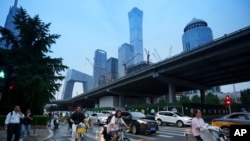Western media and Chinese official scholars are watching for signs of possible policy or political moves at China's long-delayed Third Plenum, but most have low expectations for any "big moves" regarding economic reform.
The top-level closed-door meeting, originally expected to be held late last fall, finally got underway Monday and wraps up Thursday.
It comes as China faces a real estate crisis, high youth unemployment, declining corporate and consumer confidence, and surging local government debt. Trade and geopolitical tensions have made these challenges even more difficult.
Even Chinese Premier Li Qiang seemed to suggest that the Third Plenum would not bring any "big moves." At the "Summer Davos" in Dalian in June, he said that the Chinese economy, which is recovering from the pandemic, needs to "strengthen its foundation" and that it is not the time to "use drastic measures."
A recent Asia Society article ahead of the meeting said, "Xi will continue to prioritize Party control, financial de-risking, technological self-reliance, and investment-heavy industrial policy."
But, a former senior Chinese official recently told the group's Center for China Analysis, Xi "could deliver 'positive surprises' ... to tackle issues such as weak productivity, geoeconomic restrictions, a struggling property sector, and the fiscal distress of local governments."
Here are a few key things to watch for during the meetings:
'New quality productive forces'
"New quality productive forces" is a concept first proposed by Chinese leader Xi Jinping in 2023 that refers to promoting scientific and technological innovation and independence. Observers expect it to be a key topic during this week's meetings.
Speaking at the National Science and Technology Conference late last month, Xi reiterated China's goal to become a scientific and technological power by 2035, noting that the field of high technology "is reshaping the global order and development pattern."
Earlier in March, Chinese Premier Li Qiang talked about the country unleashing a "new leap forward" highlighting the government's plans to support developing sectors and industries from life sciences to electric vehicles, new materials, commercial spaceflight and quantum technologies.
In a recent commentary on the meetings, Yu Jie, senior research fellow on China at Chatham House, wrote, "Beijing has firmly shifted its growth paradigm, from chasing a nominal growth rate into building a resilient economy driven by innovation that can cope with protracted geopolitical repercussions. This gathering will give a final political stamp to do so."
Personnel changes
Although most observers believe the plenum was delayed from late last year until this week largely because of the economic challenges China has been facing, incidents involving the removal of several high-ranking officials could also have been a factor. That is something Xi might address during this week's meetings.
Last July, Beijing replaced Qin Gang as foreign minister and removed Rocket Force Commander Li Yuchao and Political Commissar Xu Zhongbo from their posts, accusing them of corruption.
In October, former Defense Minister Li Shangfu was removed from his post. Late last month, shortly before this week's meeting, he was expelled from the party for taking bribes.
The Central Commission for Discipline Inspection also announced in May that it had launched an investigation into Tang Renjian, China's minister of agriculture and rural affairs.
Observers say the plenum is Xi's chance to confirm the removal of these officials from the Central Committee.
The Asia Society notes that "Article 42 of the Party Charter says the Central Committee must confirm by a two-thirds majority any decision to discipline a full or alternate member that involves dismissal, probation, or expulsion. The Politburo can make such decisions, but in most cases, they must be retroactively endorsed by the Central Committee."
The Asia Society statement continued, "The plenum will almost certainly expel Li Shangfu and could well remove the other four cadres, but the lack of official announcements about Qin, Xu, and Li Yuchao creates a sliver of uncertainty about their fates. It is possible, for example, that Qin is not expelled but put on probation, or that he is not mentioned because his investigation remains ongoing."
Observers say it is also worth watching to see if Dong Jun, China's current defense minister, who replaced Li Shangfu at the end of last year, will be promoted to the Central Military Commission of the Communist Party of China. Article 14 of the Central Committee's Work Regulations states that the plenum is the only meeting that can add new members to the Central Military Commission.
Real estate
China's property crisis is another big challenge. The outside world will closely watch to see what measures the Chinese government may take to support the real estate industry.
The State Council of China held a meeting in June to "listen to reports on the current real estate market situation and the next steps in building a new model for real estate development" and put forward the task of "destocking" the real estate market. This has triggered expectations for new measures and additional financial support from the plenum.
Beijing launched a series of measures to save the housing market in May. In addition to lowering mortgage interest rates and down payment ratios, the People's Bank of China announced plans to set up a 300 billion yuan — roughly $41.3 billion in U.S. dollars — "affordable housing refinancing" for local governments and local state-owned enterprises to purchase unsold commercial housing stocks for use as affordable housing.




